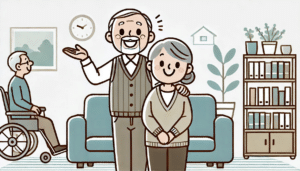
Senior care facilities do more than offer a place to stay. They provide essential health services tailored to meet diverse needs.
The support is wide-ranging, from physical therapy programs that restore mobility to routine health monitoring for chronic conditions.
The level of care shifts as you move from independent living setups to skilled nursing homes, offering personalized attention every step of the way.
If you’re unsure about the assets that define top-tier care facilities, stay with us as we explore what truly makes them indispensable.
Understanding Different Levels of Care in Senior Facilities
Senior care facilities cater to various needs, offering different levels of care based on resident requirements. These levels help families choose the right environment for their loved ones.
Here’s an overview of the most common setups:
- Independent Living focuses on active seniors who need minimal assistance. It offers housekeeping, meal options, and community events.
- Assisted Living supports those requiring help with daily activities like dressing or medication management while encouraging independence where possible.
- Memory Care units specialize in caring for residents with Alzheimer’s or dementia through structured routines and secure environments.
- Skilled Nursing provides 24/7 medical care from licensed nurses for individuals recovering from surgery or managing chronic conditions.
Facilities often tailor services to evolve alongside a resident’s changing needs. The goal is to balance comfort and necessary support, ensuring each individual thrives in an appropriate setting.
Choosing the right level ensures both safety and quality of life are prioritized effectively within senior living communities.
How Routine Health Monitoring Keeps Residents Safe
Routine health monitoring is a cornerstone of senior care facilities. It ensures potential health concerns are identified and managed before they escalate into serious issues.
Key aspects of this service include:
- Regularly scheduled checkups by on-site healthcare professionals
- Tracking vital signs such as blood pressure, heart rate, and oxygen levels
- Early detection of infections or complications related to chronic illnesses
- Monitoring medication effectiveness and adjusting prescriptions as needed
For instance, those needing an IOP in Tampa can benefit from regular evaluations that track progress and maintain stability over time. Facilities integrate advanced technology like wearable devices for continuous tracking, enhancing safety even further.
These proactive measures create peace of mind for both residents and their families while ensuring every individual receives attentive care tailored to their specific health needs daily.
Therapy Programs Designed for Senior Mobility and Strength
Therapy programs in senior care facilities are essential for maintaining or improving physical well-being. They target mobility, strength, and overall independence, promoting a higher quality of life.
These programs typically include:
- Physical therapy to improve balance, flexibility, and coordination
- Occupational therapy that focuses on regaining skills needed for daily tasks
- Speech therapy to address swallowing difficulties or communication challenges after strokes
- Group exercise classes tailored to different fitness levels for social engagement while staying active
Sessions often use equipment like resistance bands or stability balls designed with seniors’ needs in mind. Therapy plans are personalized based on individual health conditions and recovery goals. With the proportion of people aged over 65 projected to top 16% by 2050, these programs and the facilities offering them will become increasingly important.
Managing Chronic Conditions The Role of Skilled Nursing Homes
Skilled nursing homes provide comprehensive care for residents managing chronic conditions. These facilities prioritize both medical support and comfort to ensure stability and quality of life.
Their services often include:
- 24/7 access to licensed nurses who monitor symptoms and provide timely interventions
- Customized care plans addressing specific health issues like diabetes, heart disease, or arthritis
- Medication administration schedules overseen by healthcare professionals to prevent errors
- Access to specialists such as cardiologists or endocrinologists for complex conditions requiring expertise
In addition, skilled nursing homes integrate therapies like pain management techniques or dietary planning tailored for chronic illness needs. This level of focused care supports long-term health goals while addressing day-to-day challenges.
With these resources in place, residents gain the medical oversight they need without compromising their overall well-being within a structured environment designed for recovery and maintenance.
Specialized Memory Care Services for Cognitive Health
Memory care units are dedicated to supporting residents with Alzheimer’s, dementia, or other cognitive impairments which impact more than 55 million people globally. These services combine safety measures with therapeutic programs to enhance quality of life and mental health.
Core features often include:
- Secure environments designed to prevent wandering and promote safety
- Structured daily routines that provide consistency and reduce confusion
- Activities like puzzles or music therapy aimed at stimulating memory retention
- Personalized care plans based on the progression of cognitive decline
Trained staff work closely with families, offering communication tips and updates on their loved ones’ well-being. Sensory therapies are also introduced to evoke positive emotions while encouraging interaction.
Wrapping Up
Senior care facilities offer more than just a place to live. Their essential services, from health monitoring to specialized memory care, ensure safety, comfort, and well-being. Choosing the right facility means finding one that aligns with your loved one’s needs, promoting both independence and support for a fulfilling life ahead.